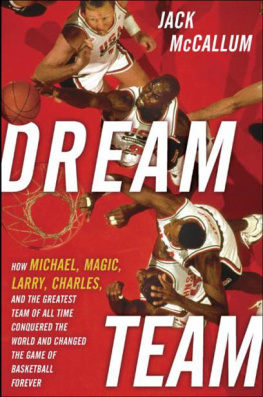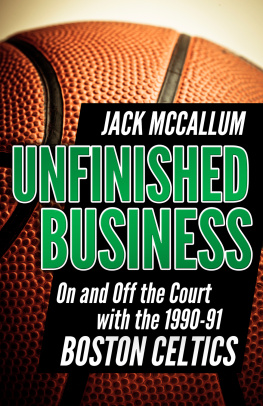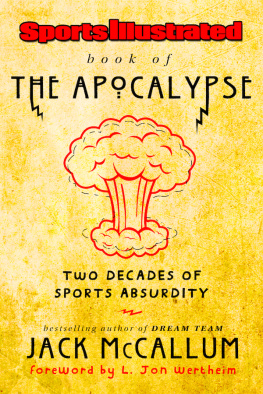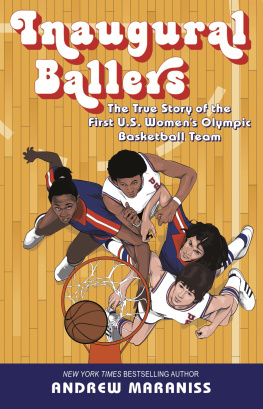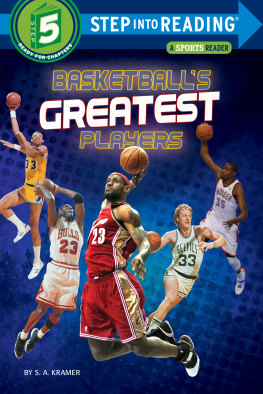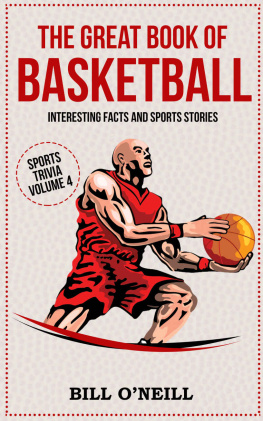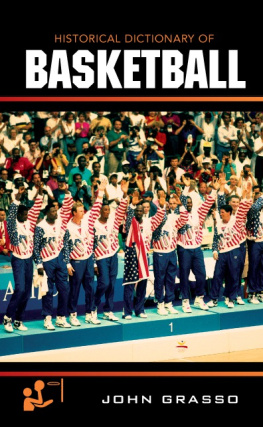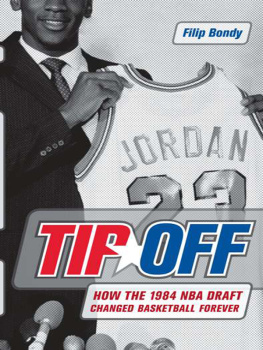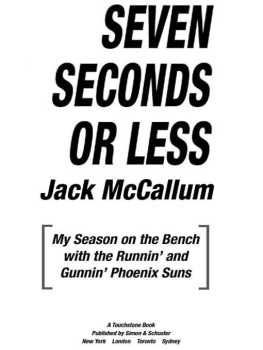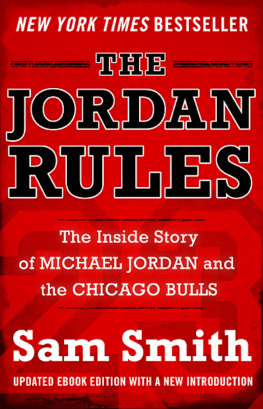ACKNOWLEDGMENTS
This book would not have been possible without the cooperation of the Dream Team members, all of whom I interviewed face-to-face. Anyone who has ever dealt with pro athletes knows that rounding them up is like herding cats if the cats were millionaires with handlers, busy schedules, and global fame. But the process was enjoyable (in some strange way) and, more to the point, rewarding when I got to them. They were not easy to pin down, but, once I had them in front of me, it was their memories of, and passion for, this team that most colors the tone of this book.
I spent hours with several of them in their own habitat: a long Long Island breakfast with Mullin and another with Pippen in Florida; lunch at Drexlers house; a tour of Spokane conducted by Stockton; a morning at his school with Robinson; a morning and afternoon staring at the taxidermied conquests in Malones Louisiana home; dinner and drinks (not too many) with Barkley in Phoenixthese are all pleasant memories that also bore journalistic fruit.
I hadnt seen many of them in a while, but past patterns reemerged immediately. Jordan aired out some ancient grudges about Sports Illustrated, and Bird took one look at me as I waited for him by his office in Indianapolis, and said, What are you doing here? Thought youd be driving around Magic in a limousine. At least he didnt say anything more graphic.
There are many others who helped, and I hope I havent forgotten anyone, but four names stand out for their institutional memory about this teamMike Krzyzewski, P. J. Carlesimo, Russ Granik, and Jan Hubbard. I went back to the well more than once with all four of them. Mike Wilbon, with a memory as sharp as his barbs on Kornheiser, was a great source during a long breakfast talk.
Pete Skorich, formerly a Detroit Pistons executive and the man who shot most of the Dream Team live footage, was of enormous importance. And a big shout-out to Sports Illustrated editor Chris Stone for encouragement, as well as to Mickey Steiner for editorial assistance.
My agent, Scott Waxman, and my editor, Mark Tavani, deserve tips of the hat, as does former Random House editor Paul Taunton and ESPNs Steve Wulf.
Here are others who were generous with their time and memories, organized by the way I remember them. They are basketball and TV executives, Dream Team committee members, coaches, public relations people, print journalists, photographers, and players.
David Stern, Boris Stankovic, Rod Thorn, Dick Ebersol, Kim Bohuny, Rick Welts, Steve Mills, C. M. Newton, Harvey Schiller, Bill Wall, Tom McGrath, and Horace Balmer.
Donnie Nelson, Rick Carlisle, and Lenny Wilkens.
Jeffrey Orridge, Donnie Walsh, Quinn Buckner, and Charles Grantham.
David Falk, Lon Rosen, and Fred Whitfield.
Brian McIntyre, Terry Lyons, Don Sperling, Julie Fie, Josh Rosenfeld, Craig Miller, Nat Butler, Andy Bernstein, Florian Wanninger from FIBA, and Dion Cocoros and Paul Hirschheimer from NBA Entertainment.
Jackie MacMullan and Sam Smith, both of whose books are conjured up frequently in the manuscript, and, to the best of my ability, were given fair attributional recognition. Also, I single out Bill Simmons, a much younger man than myself who is capable of writing much longer books and achieving much greater cultural relevancy. Also, David Dupree, my eternal courtside colleague, and Bob Ryan, the eternal Commish.
Grant Hill and Bill Laimbeer shared their very differing experiences with the Dream Team, as did, with considerably more reticence, one of my all-time favorites, Joe Dumars. (This is the time to point out that Laimbeer and Dumarss erstwhile Detroit Pistons teammate Isiah Thomas, a nonDream Teamer who is a big part of this story, declined my request for an interview.)
Of the international players, Dirk Nowitzki (well, hes more a Dallas Maverick these days), Sarunas Marciulionis, and Juan Antonio Orenga were terrific and candid, and Toni Kukoc also gamely offered his thoughts on the night that he got legally assaulted by Scottie Pippen and Michael Jordan.
Two people who were close to the Dream Team died as I was finishing this manuscriptMatt Dobek, who was a friend of mine, and Dave Gavitt, without whose steady diplomacy there might not have been a Dream Team, at least not in the form that finally transpired. I had already collected their thoughts and memories, and I remembered them often as I wrote these words.
Chuck Daly died before I began the project. Over the years we had talked often about his Dream Team experience, and I could feel his steady presence throughout.
ALSO BY JACK MCCALLUM
FICTION
Foul Lines: A Pro Basketball Novel (with L. Jon Wertheim)
NONFICTION
Unfinished Business: On and Off the Court with the 199091 Boston Celtics
Shaq Attaq!
Full Circle: An Olympic Champion Shares His Breakthrough Story
Seven Seconds or Less: My Season on the Bench with the Runnin and Gunnin Phoenix Suns
ABOUT THE AUTHOR
J ACK M C C ALLUM is the author of two previously critically acclaimed basketball books, Unfinished Business and Seven Seconds or Less, both of which chronicled the season of an NBA team, the 199091 Boston Celtics in the former, the 200506 Phoenix Suns in the latter. In 2005, he won the Naismith Memorial Basketball Hall of Fames Curt Gowdy Award for excellence in basketball writing. A senior writer at Sports Illustrated for 30 years, he lives in Pennsylvania with his wife, and is the father of two and the grandfather of one.
CHAPTER 1
THE INSPECTOR OF MEAT

Pros in the Olympics? It Was His Idea, and Dont Let Anyone Tell You Different
He first came to the United States in January 1974, dispatched by his boss to study up on American basketball. He didnt speak the language, didnt know the customs, and settled into the basketball hotbed of Billings, Montana, because thats where he could secure free lodging with a Yugoslavian family.
This stranger in a strange land was named Boris Stankovic. He was six months from his forty-ninth birthday and he had come on behalf of FIBA. At the time not more than a dozen Americans knew what it stood for (Fdration Internationale de Basketball), where it was headquartered (at the time in an apartment in Munich, later in Geneva), and what the hell it did (governed amateur basketball in all parts of the world except the United States). You cannot know basketball if you do not know basketball in the United States, Stankovic was told by R. William Jones, who as secretary-general ran FIBA with a bow tie, a lit cigar, and a dictators fist. So Stankovic came and was instantly seduced by the college games he saw liveUCLAs redheaded phenomenon, Bill Walton, was his favorite playerand the NBA games he saw on television.
For much of his early adult life, Stankovic had been a meat inspector in Belgrade. My job was to look over the meat and cheese and, as you do here, put a stamp on it, said Stankovic when I interviewed him in Istanbul in the summer of 2010. He is retired now but comes to many events as the minence grise of international basketball. Stankovic had earned a degree in veterinary medicine in 1945 from the University of Belgrade. It was natural in our country that veterinarians looked after the meat and cheese, because it has to do with animals, no?
The type of meat Stankovic most liked to inspect, though, was the cured leather on a basketball. Even as he was arising at five in the morning to take up his meat stamp and lace up his white apron, basketball is what moved his spirit. He was an earthbound, fundamentally sound low-post forward who played thirty-six games for the Yugoslavian national team. One of his proudest moments was playing for his country in the first world championship organized by FIBA, which took place in Argentina in 1950. We finished ninth, says Stankovic, chuckling, and there were nine teams. One of his enduring regrets was that he never participated in the Olympics as a player.

